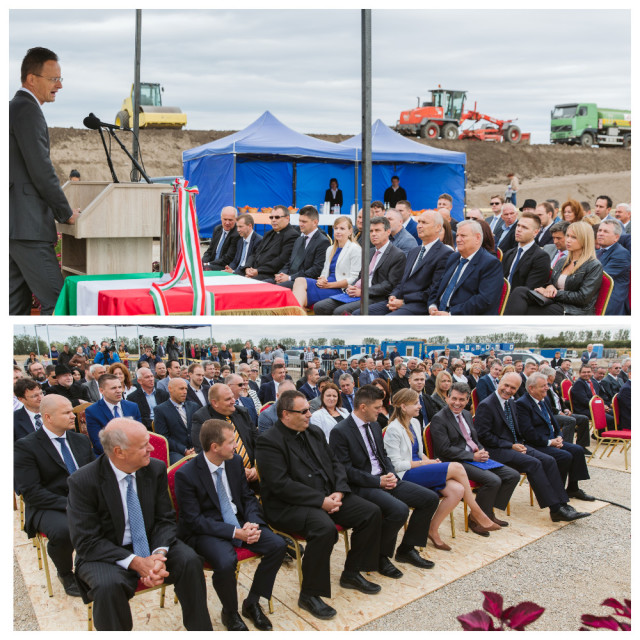IIB supports one of the largest investment project in last 20 years in South-East Hungary

The delegation of the International Investment Bank (IIB) led by the Deputy Chairman of the Board, Mr. Denis Ivanov, took part in the ground breaking ceremony of placing the cornerstone of the green-field waterfowl slaughtering and meat processing factory of the Hungarian client of IIB, Hunent, in the countryside location of Mélykút, South-East Hungary, on the 15th of September, 2017.
The IIB approved the provision of a credit guarantee and a performance guarantee respectively in favour the funds-provider commercial bank, Sberbank, and towards the Hungarian Investment Promotion Agency (HIPA), which disburses non-refundable state grants as a supplement of its own equity in the project.
The official event took place at the site of the new development and involved the Minister of Foreign Affairs and Trade of Hungary, Mr. Péter Szijjártó, prominent entrepreneurs, decision makers of national authorities involved in the licensing, the top executives of the funding banks and policymakers, municipality mayors of the neighbouring region, members of the Parliament, the CEO of HIPA, and dozens of local residents.
During his speech, Mr. Szijjártó emphasized the crucial role the International Investment Bank has played in realizing the project, thus justifying the Hungarian Government’s significant decision to resume shareholding in the Bank in 2015. As the representant of the third largest member state in the Bank, the foreign minister, who presides over HIPA as well as the Hungarian Eximbank, expressed his gratitude to the Bank for re-starting its lending activity in Hungary, thereby contributing to the creation of new jobs, and hope that more and more resources will be attracted through the IIB.
«The large-scale loan provided by the IIB, where Russia is the largest shareholder, is an important input into this investment and demonstrates clearly that the world economic trend suggests that capital does not just flow from West to East now, but also from East to West. And whoever does not understand it, denies it or is not willing to recognize it will deprive their own country of very serious economic opportunities, ” – added Mr. Szijjártó.
The IIB delegation participated in a direct, face-to-face meeting with the Hungarian foreign minister, who was accompanied by the CEO of HIPA, Mr. Róbert Ésik, and the CEO of the Hungarian Eximbank, Mr. Zoltán Urbán. During the negotiations, Mr. Denis Ivanov, Deputy Chairman of the IIB Board, highlighted the credit exposures IIB has already planned and committed to Hungary, namely Invitel, Hunent and MOL. All in all an EUR 80 mln exposure in the Bank’s balance sheet. Mr. Ivanov also underlined the Bank’s commitment to elevate the local presence of the Bank and its willingness to further enlarge its financing commitments in favour of Hungarian investments of socio-economic material importance. This has been broadly welcomed and appreciated by Minister Szijjártó, who also underlined his expectations of IIB increasing its key role – as he put it - in enhancing and rising Hungary´s business and trade cooperation with other IIB member States.
The Hunent deal calls for an EUR 40 mln investment into a state-of-the-art technological agriculture waterfowl processing factory of 18.400 m2 usable factory floor, which is capable of processing of 50.000 ducks or 25.000 geese in a one-day shift. With this new investment, Hunent, who has been in the poultry-waterfowl business for over 30 years, provides for an additional 350 new jobs in a South-Eastern region of Hungary, which has suffered a sluggish regional growth and a high unemployment in recent decades.
Due to the highly marketable product range in the Western, mainly German markets, HIPA has granted EUR 16 mln, 40% of the project total costs, as non-refundable subsidy. The project is planned in two phases, with the first one encompassing 70% of total investment volume, expected to be finished by the end of 2018, whilst the second phase, contributing to the already established vertical from slaughterhouse to finished product coolhouse with a grilling facility, is planned to be operational by the end 2019.
